Subtitle "Afrikaans" was produced by machine.Subtitle "አማርኛ" was produced by machine.Subtitle "العربية " was produced by machine.Subtitle "Ārāmāyâ" was produced by machine.Subtitle "azərbaycan dili " was produced by machine.Subtitle "беларуская мова " was produced by machine.Подзаглавието "България" е създадено от машина.Subtitle "বাংলা " was produced by machine.Subtitle "བོད་ཡིག" was produced by machine.Subtitle "босански" was produced by machine.Subtitle "català" was produced by machine.Subtitle "Cebuano" was produced by machine.Subtitle "ગુજરાતી" was produced by machine.Subtitle "corsu" was produced by machine.Podtitul "Čeština" byl vytvořen automaticky.Subtitle "Cymraeg" was produced by machine.Subtitle "Dansk" was produced by machine.Untertitel "Deutsch" wurde maschinell erzeugt.Subtitle "Untertitel" was produced by machine.Subtitle "Ελληνικά" was produced by machine.Subtitle "English" was produced by machine.Subtitle "Esperanto" was produced by machine.El subtítulo "Español" se generó automáticamente.Subtitle "Eesti" was produced by machine.Subtitle "euskara" was produced by machine.Subtitle "فارسی" was produced by machine.Subtitle "Suomi" was produced by machine.Le sous-titrage "Français" a été généré automatiquement.Subtitle "Frysk" was produced by machine.Subtitle "Gaeilge" was produced by machine.Subtitle "Gàidhlig" was produced by machine.Subtitle "Galego" was produced by machine.Subtitle "Schwizerdütsch" was produced by machine.Subtitle "هَوُسَ" was produced by machine.Subtitle "Ōlelo Hawaiʻi" was produced by machine.Subtitle "עברית" was produced by machine.Subtitle "हिन्दी" was produced by machine.Subtitle "Mẹo" was produced by machine.Subtitle "Hrvatski" was produced by machine.Subtitle "Kreyòl ayisyen " was produced by machine.Subtitle "Magyar" was produced by machine.Subtitle "Հայերեն" was produced by machine.Subtitle "Bahasa Indonesia " was produced by machine.Subtitle "Asụsụ Igbo " was produced by machine.Textun"Íslenska" var framkvæmt vélrænt.Sottotitoli "Italiano" sono stati generati automaticamente.字幕は"日本語" 自動的に生成されました。Subtitle "Basa Jawa" was produced by machine.Subtitle "ქართული" was produced by machine.Subtitle "қазақ тілі " was produced by machine.Subtitle "ភាសាខ្មែរ" was produced by machine.Subtitle "ಕನ್ನಡ" was produced by machine.Subtitle "한국어" was produced by machine.Subtitle "कोंकणी語" was produced by machine.Subtitle "کوردی" was produced by machine.Subtitle "Кыргызча" was produced by machine.Subtitle " lingua latina" was produced by machine.Subtitle "Lëtzebuergesch" was produced by machine.Subtitle "Lingala" was produced by machine.Subtitle "ພາສາ" was produced by machine.Subtitle "Lietuvių" was produced by machine.Subtitle "Latviešu" was produced by machine.Subtitle "fiteny malagasy" was produced by machine.Subtitle "te reo Māori" was produced by machine.Subtitle "македонски јазик" was produced by machine.Subtitle "malayāḷaṁ" was produced by machine.Subtitle "Монгол хэл" was produced by machine.Subtitle "मराठी" was produced by machine.Subtitle "Bahasa Malaysia" was produced by machine.Subtitle "Malti" was produced by machine.Subtitle "မြန်မာစာ " was produced by machine.Subtitle "नेपाली" was produced by machine.Subtitle "Nederlands" was produced by machine.Subtitle "Norsk" was produced by machine.Subtitle "chiCheŵa" was produced by machine.Subtitle "ਪੰਜਾਬੀ" was produced by machine.Subtitle "Polska" was produced by machine.Subtitle "پښتو" was produced by machine.Subtitle "Português" was produced by machine.Subtitle "Română" was produced by machine.Subtitle "Язык жестов (Русский)" was produced by machine.Субтитры "Pусский" были созданы машиной.Subtitle "Kinyarwanda" was produced by machine.Subtitle "सिन्धी" was produced by machine.Subtitle "Deutschschweizer Gebärdensprache" was produced by machine.Subtitle "සිංහල" was produced by machine.Subtitle "Slovensky" was produced by machine.Subtitle "Slovenski" was produced by machine.Subtitle "gagana fa'a Samoa" was produced by machine.Subtitle "chiShona" was produced by machine.Subtitle "Soomaaliga" was produced by machine.Subtitle "Shqip" was produced by machine.Subtitle "србски" was produced by machine.Subtitle "Sesotho" was produced by machine.Subtitle "Basa Sunda" was produced by machine.Undertext "Svenska" är maskinell skapad.Subtitle "Kiswahili" was produced by machine.Subtitle "தமிழ்" was produced by machine.Subtitle "తెలుగు" was produced by machine.Subtitle "Тоҷикй" was produced by machine.Subtitle "ภาษาไทย" was produced by machine.Subtitle "ትግርኛ" was produced by machine.Subtitle "Türkmençe" was produced by machine.Subtitle "Tagalog" ay nabuo sa pamamagitan ng makina.Subtitle "Türkçe" was produced by machine.Subtitle "татар теле" was produced by machine.Subtitle "Українська " was produced by machine.Subtitle "اردو" was produced by machine.Subtitle "Oʻzbek" was produced by machine.Subtitle "Tiếng Việt" was produced by machine.Subtitle "Serbšćina" was produced by machine.Subtitle "isiXhosa" was produced by machine.Subtitle "ייִדיש" was produced by machine.Subtitle "Yorùbá" was produced by machine.Subtitle "中文" was produced by machine.Subtitle "isiZulu" was produced by machine.
kla.TV accepts no liability for defective translation.kla.TV accepts no liability for defective translation.kla.TV accepts no liability for defective translation.kla.TV accepts no liability for defective translation.kla.TV accepts no liability for defective translation.kla.TV accepts no liability for defective translation.kla.TV не носи отговорност за некачествен превод.kla.TV accepts no liability for defective translation.kla.TV accepts no liability for defective translation.kla.TV accepts no liability for defective translation.kla.TV accepts no liability for defective translation.kla.TV accepts no liability for defective translation.kla.TV accepts no liability for defective translation.kla.TV accepts no liability for defective translation.kla.TV nenese žádnou odpovědnost za chybné překlady.kla.TV accepts no liability for defective translation.kla.TV accepts no liability for defective translation.kla.TV übernimmt keine Haftung für mangelhafte Übersetzung.kla.TV accepts no liability for inadequate translationkla.TV accepts no liability for defective translation.kla.TV accepts no liability for defective translation.kla.TV accepts no liability for defective translation.kla.TV no se hace responsable de traducciones incorrectas.kla.TV accepts no liability for defective translation.kla.TV accepts no liability for defective translation.kla.TV accepts no liability for defective translation.kla.TV accepts no liability for defective translation.kla.TV n'assume aucune responsabilité en cas de mauvaise traduction.kla.TV accepts no liability for defective translation.kla.TV accepts no liability for defective translation.kla.TV accepts no liability for defective translation.kla.TV accepts no liability for defective translation.kla.TV accepts no liability for defective translation.kla.TV accepts no liability for defective translation.kla.TV accepts no liability for defective translation.kla.TV accepts no liability for defective translation.kla.TV accepts no liability for defective translation.kla.TV accepts no liability for defective translation.kla.TV accepts no liability for defective translation.kla.TV accepts no liability for defective translation.kla.TV nem vállal felelősséget a hibás fordításértkla.TV accepts no liability for defective translation.kla.TV accepts no liability for defective translation.kla.TV accepts no liability for defective translation.kla.TV tekur enga ábyrgð á áræðanleika þýðingarinnarKla.TV non si assume alcuna responsabilità per traduzioni lacunose e/o errate.Kla.TV は、不適切な翻訳に対して一切の責任を負いません。kla.TV accepts no liability for defective translation.kla.TV accepts no liability for defective translation.kla.TV accepts no liability for defective translation.kla.TV accepts no liability for defective translation.kla.TV accepts no liability for defective translation.kla.TV accepts no liability for defective translation.kla.TV accepts no liability for defective translation.kla.TV accepts no liability for defective translation.kla.TV accepts no liability for defective translation.kla.TV accepts no liability for defective translation.kla.TV accepts no liability for defective translation.kla.TV accepts no liability for defective translation.kla.TV accepts no liability for defective translation.kla.TV accepts no liability for defective translation.kla.TV accepts no liability for defective translation.kla.TV accepts no liability for defective translation.kla.TV accepts no liability for defective translation.kla.TV accepts no liability for defective translation.kla.TV accepts no liability for defective translation.kla.TV accepts no liability for defective translation.kla.TV accepts no liability for defective translation.kla.TV accepts no liability for defective translation.kla.TV accepts no liability for defective translation.kla.TV accepts no liability for defective translation.kla.TV accepts no liability for defective translation.kla.TV accepts no liability for defective translation.kla.TV accepts no liability for defective translation.kla.TV accepts no liability for defective translation.kla.TV accepts no liability for defective translation.kla.TV accepts no liability for defective translation.kla.TV accepts no liability for defective translation.kla.TV accepts no liability for defective translation.kla.TV accepts no liability for defective translation.kla.TV accepts no liability for defective translation.kla.TV не несет ответственности за некачественный перевод.kla.TV accepts no liability for defective translation.kla.TV accepts no liability for defective translation.kla.TV accepts no liability for defective translation.kla.TV accepts no liability for defective translation.kla.TV accepts no liability for defective translation.kla.TV accepts no liability for defective translation.kla.TV accepts no liability for defective translation.kla.TV accepts no liability for defective translation.kla.TV accepts no liability for defective translation.kla.TV accepts no liability for defective translation.kla.TV accepts no liability for defective translation.kla.TV accepts no liability for defective translation.kla.TV accepts no liability for defective translation.Kla.TV tar inget ansvar för felaktiga översättningar.kla.TV accepts no liability for defective translation.kla.TV accepts no liability for defective translation.kla.TV accepts no liability for defective translation.kla.TV accepts no liability for defective translation.kla.TV accepts no liability for defective translation.kla.TV accepts no liability for defective translation.kla.TV accepts no liability for defective translation.kla. Walang pananagutan ang TV sa mga depektibong pagsasalin.kla.TV accepts no liability for defective translation.kla.TV accepts no liability for defective translation.kla.TV accepts no liability for defective translation.kla.TV accepts no liability for defective translation.kla.TV accepts no liability for defective translation.kla.TV accepts no liability for defective translation.kla.TV accepts no liability for defective translation.kla.TV accepts no liability for defective translation.kla.TV accepts no liability for defective translation.kla.TV accepts no liability for defective translation.kla.TV accepts no liability for defective translation.kla.TV accepts no liability for defective translation.
This is a modal window.
The media could not be loaded, either because the server or network failed or because the format is not supported.
The Hidden Motives Behind World Wars - A Historic Review with Professor Richard Drake
Prof. Richard Drake teaches history at the University of Montana and is enthusiastic about bringing history to life. In this interview he shares little known perspectives of famous US historians, such as Charles Austin Beard, on the two World Wars. Could it be that there were deeper reasons for the wars than we are being told. The immense human costs of these wars could have been spared if different voices had been heard. What can we learn from them? Watch this interview for a history lesson of its finest.
[continue reading]
The Hidden Motives Behind World Wars - A Historic Review with Professor Richard Drake
Download broadcast and attachments in the wanted quality:
Useage rights:
Standard-Kla.TV-Licence
Topics A-Z
Enter a word for search or use the alphabetic search-order
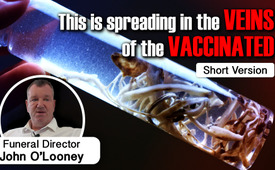

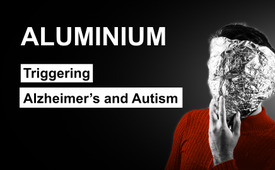

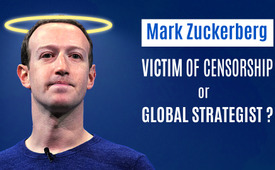

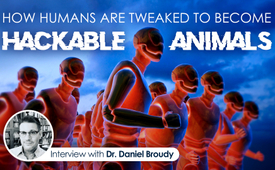

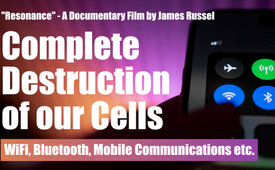



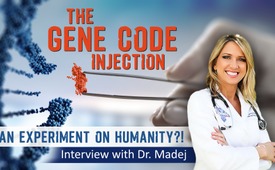



10.05.2023 | www.kla.tv/26014
Dan: Well, we're very pleased and honored to interview today Professor Richard Drake. Richard Drake is the Lucille Spear Research Professor of Politics and History at the University of Montana here in Missoula, Montana. Dr. Drake, thank you very much for joining us today. Dr. Drake: I appreciate the invitation. Dan: Dr. Drake is the author of two books I have in my hand. One is called The Education of an Anti-imperialist. It's about Robert La Follette and U.S. expansion. Robert La Follette, an American congressman and the other one is Charles Austin Beard “The return of the Master Historian of American Imperialism.” A book I just finished. This was published in 2018. And this year in April 2023 it has come out as a paperback. We'll be talking about this book and historian Charles Austin Beard. And I will switch the hardback for my very eared paperback version. Dr. Drake, tell us a little bit about Charles Beard and his significance why he's important. Dr. Drake: Beginning in 1913 when Beard published an economic interpretation of the constitution of the United States he became the most famous, influential and controversial historian in America. I think the reason for that and the sensational success of the book, an Economic Interpretation is that Beard's research revealed the fundamentally oligarchical character of the American political system. He showed how the rich ruled here and the anti-democratic consequences of their rule. It was a book that just took off. It really became an exemplary book for progressive historians critical of the status quo and there was a great market for that criticism in the early years of the 20th century right through I would say until the second World War. Dan: Was part of the demand for that criticism, the American public's feelings about whether we should have gone into World War I? Dr. Drake: Well, the World War I occurred, our intervention in the first World War occurred in April of 1917, some three years and more after the outbreak of the war. And there was an enormous controversy in the United States. You mentioned Robert La Follette a little bit earlier. He was the progressive liberal Republican senator- we had such creatures as that in America in the early 20th. Dan: What does that mean exactly, a progressive Republican? It sounds strange today. Dr. Drake: Very critical of the capitalist status quo and wanting to reform it in a populace democratic way. And that was La Follette’s cause as a senator. But he led the fight in the US Senate against American intervention in the first World War. He lost that fight. But it was a magnificent stand that he took which I tried to describe in that La Follette book you mentioned. Beard, ironically, who was also a progressive Republican in those days, supported Woodrow Wilson’s crusade to make the world safe for democracy. He later repented of that decision; he called it the greatest mistake of his life and spent the rest of his career trying to undo the damage of America’s intervention in that war, which he thought was a tragic mistake. Dan: When did his moment of repentance come? Was it during the Paris peace accords? Dr. Drake: Yes, it was and more precisely it came when he read John Maynard Keynes’ “Economic Consequences of the Peace”. Now Keynes was the leading economist of the day, certainly in Britain. He was a member of the British delegation at the Paris Peace Conference and when he read the treaty of Versailles, “The Diktat” as the Germans called it, when he read the treaty of Versailles he said: Oh my God, this is the beginning of the second World War. We're going to have another war because of this evil treaty. And Beard read John Maynard Keynes’ book and said: You know, I think I made a disastrous blunder here and he very quickly repented of his support for the war. He became a revisionist historian along with numerous other important historians at that time, really trying to explain the war not as a crusade for democracy. In fact, beard liked to say: We didn't fight to make the world safe for democracy. We fought to make the world safe for Wall Street. That's what that war was about. Dan: And was that the general opinion of the, let's say educated American public at the time also? Dr. Drake: I would say it became the general public opinion of people who subscribed to the Revisionist school of which Beard was a leading figure. There are numerous other historians in Europe and in America who advanced that argument that the war was not about any idealistic abstractions like democracy. It was about territory markets and resources. And the treaty of Versailles and the other treaties that came out of the Paris Peace Conference, there were five of them, and the treaty of Sèvres which dealt with the Middle east and turned - the Ottoman Empire of course is one of the big losers in World War I. The Ottoman Empire fought with the Germans and with the Austrians and lost and so they lost their entire empire. Well, where did their empire in the middle east go? Iraq, Syria? All those areas that the Ottoman Empire had controlled all went to Britain. Britain took over Palestine, Iraq. France took over Syria. In other words, the war was about a switch of imperialist masters, had nothing to do with democracy, human rights, liberty, all of that was gibberish. And Beard made that argument from that point on in his writing. And I think he was right. Dan: Yes, I remember one line that stands out in your book. It more resembled a gang land fight over turf and markets. Dr. Drake: Yeah, I mean that's a perfect image and I think he was right to state that. Dan: Right. Well, I don't want to jump ahead too quickly, but in American history, one thing we can be sure of, right, is that okay, maybe we made a mistake in World War I but when we get to World War II, now we have the good war and that one was legitimate and these things don't apply. Dr. Drake: Beard disputed that argument, too. Dan: From the get-go? Dr. Drake: From the get-go. He thought that World War II was a re-enactment of the first World War. In fact, he liked to say World War II and World War I are really one war with a 20-year armistice in between. And they both were about territories, markets, and resources. He liked to say that to understand World War II, you must realize first that it was an economic event, more than anything else. Franklin Delano Roosevelt, the president of the country during World War II, claimed in the famous Four Freedoms Speech that the United States was intervening, wanted to intervene in the second World War in order to fight for the Four Freedoms. Freedom of worship, freedom of speech, freedom from want and freedom from fear. Those are the four freedoms. Beard said those are noble pious words, but they have nothing to do with the second World War. The second World War has everything to do with economic competition in the Pacific with Japan, economic competition with the Germans, especially in Latin America where the Germans were very active, very competitive with the United States to an alarming degree in Washington and New York. And Beard said: We need to solve issues like that diplomatically through negotiation, not by fighting a war that's going to kill 50 million people. Which is what World War II did - to say nothing of the other incredible destruction that war caused. We need to fight to prevent that if we possibly can. That's the humane thing to do here. That's my cause. That's what I'm fighting for. Till the day he died he took that stand. Dan: Now before Pearl Harbor, I mean we got into the war late, right? It starts in ‘39 and we're not in there till December ‘41, right? I would assume that Beard would have had a reasonable amount of support for his positions. Dr. Drake: He did. He had a lot of support and this is the period of the America First movement, which I read about in the book. Beard never joined the America First movement. He was not a joiner. He was a loner and a private scholar and he liked to arrive at his own conclusions without having to subject himself to groupthink of any kind. I admired him for that but He was sympathetic to the America First movement without joining it, he said they have the right idea what we need to do really is to retrace our steps back to George Washington's farewell address. A foreign policy document that he revered. And he said what did George Washington advise the American people to do when he left office at the end of his second term? He said: Well, there are two crucial points that I would like to impart to the American people. First they must learn to mind their own business. That's the first thing. Concentrate on America. Concentrate - this is his phrase that I really love - concentrate on inculcating Republican virtue in the American people. That is our cause. Not to go all over the world, not to try to manipulate other countries, which he thought we were already doing economically, really beginning with the Spanish-American war of 1898 in Latin America, and of course in the Philippines which we conquered from Spain in that war. He thought all of these imperialist forays are disastrous in the long term because they propel us down the road of imperialism and militarism. These are the infallible signs of decline and fall for every empire that has preceded us and our decline and fall will follow along the same path. He read the ancient historians. He read Tacitus. He read the Annals of Imperial Rome. He said: Oh my god, we're reliving this tragedy. And I think he was very prophetic in his forecast. Dan: Okay, so then Pearl Harbor comes along and it wrecks everything. Dr. Drake: Yes. Dan: Now the war is completely legit. It's time to get in. Now I did a report on Jeanette Rankin who has a hall here at this university. Dr. Drake: Yes, she does. Dan: And she was brave enough to be the only congressman in either - whether in the House or the Senate to vote against World War II which was tremendously unpopular; she knew it would destroy her reputation. When Pearl Harbor occurred where did Beard stand? Jeanette Rankin went before Congress one year later in December 1942 and gave an interesting speech with questions about how the whole thing got started. Beard also had some information about how Pearl Harbor occurred as if it might have been set up. Dr. Drake: He was never a conspiracy theorist about Pearl Harbor and let me qualify that. He was very critical of FDR, the FDR administration, the secretary of war Henry Stimson was a particular target of his as a warmonger and a militarist. And so he was very critical of that administration in the lead up to Pearl Harbor but he was a careful historian. He went where the evidence led. He said I don't have documentary evidence that leads me to conclude definitively, decisively that there was foul play here. So he never went … and there were many writers at that time, many public intellectuals at that time who thought that indeed Pearl Harbor had been set up as an act of treachery by the United States government because they wanted to get in that war so much that they made Pearl Harbor possible by their negligence and their lack of astute management of the situation. Dan: And you could argue that strangling a nation with an embargo that is going to put them in a poor house is an act of war itself. Dr. Drake: Oh yeah, he was against the embargo. He was against antagonizing Japan. We need to solve this amicably as much as we can. Prince Konoe, the Japanese leader at the time, earlier just before World War I tried to come to some … Dan: World War II, Drake. Yeah, world war 2. …tried to come to some negotiated settlement with the United States which the United States government just refused even to entertain. Beard was critical of all that. He thought this really was a sign of Imperialist overreach by the United States in the Pacific, really aggravating bad relationships with Japan and he thought this was a tragically misguided policy by the United States and said so. Dan: I think I remember a passage in your book that said something like the gist of the page was that some people were leaning towards conspiracy and it was either Beard or someone he highly admired who said “I don't really need to look into this because I've got documentation of what Churchill and Roosevelt were talking about, at the Atlantic Conference.” And this is exactly the kind of … this is exactly what they needed since they couldn't get a war started in the Atlantic. Dr. Drake: The Atlantic Conference took place in August of 1941, just a few months before Pearl Harbor and everything that took place at that conference pointed toward war. Beard was certain that we were inevitably on the path to war either in the Atlantic or the Pacific. The attempt to bring, the attempt by the administration to encourage the outbreak of hostilities in the Atlantic did not materialize, did not materialize in success. And then the Japanese made the catastrophic mistake of cutting the ground out from under the America First movement. Because once they attacked Pearl Harbor, even though that was a classic pyrrhic victory for them. They won that battle, but they set themselves up for long-term disaster militarily and of course at that point there was nothing Beard could do but to go into silence on the war. But he continued to write letters to friends, articles occasionally in The Progressive Magazine which you may remember. He was very fond. It was the one magazine in the country with a modicum of an effort to write critically about the administration's war policy. He contributed articles to that. So he continued to be critical but had to be relatively subdued. I mean he couldn't attack the administration frontally, but he thought that the real aim of the war, again was not the Four Freedoms, the real aim finally would be revealed in the Bretton financial, the Bretton Woods financial Conference of July 1944 when the economic ministers of the allies gathered in New Hampshire to set up the financial structure of the post-war world, the international monetary fund, the world bank. Those institutions were created there. And as Beard was reading these reports in the New York Times and also in the Progressive Magazine which covered the Bretton Woods Conference carefully… Dan: That was La Follette's … Dr. Drake: Yeah, he started… La Follette started that magazine in 1909. He died in 1925, his son, Robert Marion La Follette jr. carried on for a while and then another editor Morris Rubin, a very bright guy, he was about 28 when he took over as editor and was a fearless critic of the administration's policy focusing on the economic factors. What's going on in the Pacific to promote the economic well-being of the American financial cartels, the monopolies? He said that's really what this war is about. And so Beard agreed with all of that and in his articles for The Progressive and his post-war books that he wrote in 1946 and 1948, he echoed that economic interpretation of World War II. It is fundamentally an economic event, you need to understand that to understand the world we're living in and the Bretton Woods financial Conference where the Americans displayed their leadership of the world, we - the World Bank, the International Monetary Fund are American institutions, as the UN is. And Beard said: I think I understand what's going on here: There is an American hegemony taking place and it's not something that just popped out of the woodwork in 1944. This was the aim all along even before we got into the war, these activities were taking place. The economic planning, the economic interpretation of history, he argued has been validated more vividly than ever before by World War II. World War II is exhibit A in defense of the economic interpretation of history, which he'd been espousing all through his career. He said, I feel vindicated. I feel that my career has been vindicated with the way this war has turned out. He died in 1948 but lived long enough to see the creation of…the launching of the Marshall Plan. He died the year before NATO was formally created in April of 1949. He died in September of 1948. So he didn't quite get to see NATO, but he could see that coming and he really envisaged the Western World, Europe which … All those countries were smashed. Germany was just eviscerated, Italy was badly damaged, the British economy was destroyed even though they were on the victorious side. And he said, this… what's now happening, what's now taking place is the creation of an American hegemony and this hegemony he predicted would be the outstanding fact of the coming decades and generations, the world we're living in. And I think this really made him a prophetic writer. He's not just an historian. He looked ahead to the future and saw what was coming. Dan: Based on the history of the League of Nations and the fact that one could argue that that was a tool for British and American hegemony and Beard knew all about that what would he have predicted about the UN in terms of its … of the U.S. influencing the UN? Dr. Drake: Well, you're certainly right about the League of Nations being a tool for British imperialism. The United States however did not join the League of Nations as you know, and … but we had a very important role. We were the only country with any money after World War I. Everybody else was broke. The Germans were financially destroyed by that war. I mean we've all seen the images of the Weimar Republic, and people wheeling wheelbarrows full of marks to buy a loaf of bread, I mean they were “kaput” after World War I as the other European powers were. But the United States, the only power with money, with financial, with wealth played a very important role funding the post-war even though we weren't part of the League of Nations. Very long complex stories why… in fact La Follette opposed our joining the League of Nations. As you may remember from reading the La Follette book. He thought that the League of Nations as you’ve said earlier, would be a tool for the victors, right? World War I, La Follette believed and Beard came to believe, World War I was about empire. It was a struggle for imperial control, of Africa, of the Middle East, of the World and what the Versailles Treaty, the Treaty of Sèvres dealing with … what they all show is that the war ended in a rearrangement of global economic assets. And of course as you also know, Dan, from reading the book, Beard was a great admirer of the historian Brooks Adams who was the grandson of John Quincy Adams. Of course, Henry Adams was the more famous historian of the two Adams’ brothers. Henry and Brooks, both historians, but Brooks Adams wrote a stunningly brilliant book in 1895. Beard loved it. The title of the book is “The law of civilization and decay”. “The law of civilization and decay.” What is the law of civilization and decay, Brooks Adams asked. He said, well the law of civilization and decay is all about the real reason for every war. Every war is about empire. Every war is about dominating the economic power of the globe in modern times. World War I really beginning with the Napoleonic wars in more recent times, that was one of the bases of Brooks Adams's argument that… that's … you have to look at the economic realities of war to understand what these conflicts are all about. And Beard was an enthusiastic admirer of that viewpoint and really started to apply that insight to understanding why World War I happened, why World War II happened, especially the conf, the economic conflict with the Japanese in the Pacific and above all the conflict with the Germans in Latin America. German businessmen were enormously successful down there and we didn't like that. We wanted that for ourselves. And this is a major factor in the deterioration of relations between Germany and America. I mean the argument, the popular argument was at the time, and I think it still is, a popular argument in the United States is that we were fighting a war for freedom, The Four Freedoms. We were fighting for democracy just as we did in World War I. And Beard, really depending on Brooks Adams for his deepest insights, said no that's not really what we were after. We really were after territories, markets, and resources, the usual reason why wars are fought. And I think that is true right down to the present moment. Dan: Speaking of all wars being economic and also speaking of being broke, I learned some new information in this book. I did not realize that the Boer War was significantly funded by the United States. Dr. Drake: Absolutely. Well that brings up a very important, an additional point of importance. One of the most decisive intellectual influences in Beard's life was the work of Hobson, John Atkinson Hobson. Great economist, a maverick economist. John Maynard Keynes admired him and I've seen their correspondence. I consulted the John Maynard Keynes archives in Cambridge, England for the La Follette book, so I know how much Keynes admired Hobson. And Hobson in his classic book “Imperialism: A Study” came out in 1902. Beard met that man. Beard was a graduate student at Oxford university for four years. He went there 1898, was there till 1902 and spent a lot of his time doing social work in Britain. I found out, I gave a paper at Oxford some years ago, and while there I checked with the registrar’s office at Oxford to see what Beard's academic record was like. I wanted to know what kind of a student he was. He didn't complete a single credit there. You know, he was too busy doing reform work. Dan: He was an activist. Dr. Drake: An activist, also a writer and he was writing a book on the side. An amazing man. Dan: He was popular. He was well received over there. Dr. Drake: …but he met Hobson during those years. And Hobson is the one in “Imperialism: A Study” who makes the classic argument. I think it's the greatest book ever written on the subject of imperialism. He says to understand imperialism in the world you need to understand the capitalist taproot that goes down into the bowels of the earth. That is what generates these wars. And Beard not only read the book and was enamored of it, he met the man and revered him and thought of him as a mentor from that point on. They were … Hobson would die in the 1930s sometime, but they were … they were allies, political allies most of that time after Beard read that book. The exception of course is when Beard was seduced by Wilsonian rhetoric about making the world safe for democracy. Hobson was too smart for that. He was too alert And he was a European and so he was right there looking at just how much ‘democratic spirit’ there was in Britain. We're an empire. I mean, we're not a democracy here in Britain So all this talk about fighting for democracy is poppycock. Any person with a brain in his head knows that. So they actually separated for a few years when Beard went into his his cheerleader mode, but as I say after reading Keynes he quickly got over that delusion and it was a permanent cure Dan: It's funny you mentioned the European point of view versus an American point of view. I remember my junior year in university, I was in Barcelona, and I was taking a a history course and the professor thought it was the funniest thing in the world the way America reacted to Watergate. He said you simpletons this stuff happens all the time.. Dr. Drake: Yeah, it does. Yeah, I think that's an interesting point and there's something to be said for the European realism on realpolitik and things like that rather than … our more naive views about how our politicians should be behaving. Dan: On the other hand, you sort of do want a populist that has a bit of idealism and hope for the future. Dr. Drake: It's interesting, I’ve met with my seminar today, I teach a course on terrorism here at the University of Montana and we have a seminar attached to the lecture course and we talked today about populism, left-wing populism and right-wing populism, and there's an assumption today and it was echoed in my class just before we met for this discussion. There's an assumption that right-wing populism is bad because that's Trump stuff. And so, you know, we're against that. It's Trump and Steve Bannon stuff. But there also was left-wing populism and Beard was very admiring of left-wing populism. He thought figures like William Jennings Bryan around the time of the Spanish-American war, Robert La Follette also was very attracted to that way of thinking. That this left-wing populism should not just be dismissed because what they were trying to do was to rein in the corporate capitalist system, the free market system to make it more democratic. To stop what to my mind is the greatest danger on earth to American democracy. The greatest danger by far, nothing compares with it, the growing wealth gap between the rich and the poor. It is a sword of Damocles hanging over the head of American democracy and so Beard always looked back to those populists with great admiration because they really wanted to find a way to prevent people from being … there shouldn't be billionaires. They don't need that money and the money is needed elsewhere in other sectors of society. We need it for education, health care, infrastructure, and and not for people to be spending, as one of Beard's great friends and one of the people he most admired, Thorstein Veblen, an economist, you know, in a classic book called Conspicuous Consumption. That's what we have in America, conspicuous consumption by the obscenely rich while untold numbers of people are suffering not only from poverty but degradation in every conceivable form. And so Beard wanted to keep that left-wing populist movement alive because even though he was a leftist he wasn't a Marxist. He was not on the Marxist left. He was on the populist progressive left and thought that we really need to find a way to promote working class issues, to advance working class people. And he thought that one of the most efficient ways to do that was to avoid getting into stupid and criminal wars which he thought Americans were addicted to. Dan: That's right and my question for you is: Is there a chance for some kind of a bipartisan left-wing populism and right-wing populism to join hands in an anti-war stance? I was really surprised about Beard's friendship- I don't know if you'd call it friendship -but with his respect for Herbert Hoover. Tell us about that a bit and does it give you hope, too, that possibly both sides can join at least on the question of war? Dr. Drake: It's the only hope we have, in my view, and I think the … and that was a friendship, it became a friendship between Charles Austin Beard, left-wing progressive historian, and Herbert Hoover, who was a free market capitalist all the way. He was very conservative Republican. Now the question is how could these two men possibly have anything to do with each other? And for a long time they didn't have anything to do with each other except to have - on Beard's part to be opposed to him. Beard voted for FDR in 1932. He voted for FDR in 1936. Remember, this is the depths of the depression. Millions of Americans were out of work. One of the reasons why so many Americans then were drawn to Beard because free market capitalism wasn't in favor at that point. The depression was perceived as one of the great tragedies that capitalism bore considerable responsibility for. And so there was a large reading audience really primed for Beard's books in those years. That's sort of a side note. But all through the early and mid 1930s Beard was a political adversary of Hoover. Now what changed to bring them together? Well, World War II happened and Hoover was also a critic of FDR's foreign policy in the lead-up to World War II. Henry Stimson who became FDR's Secretary of war had been in the Hoover administration Hoover's Secretary of State. Hoover knew Stimson. He was always reigning him in. Dan: Why did he appoint him? Dr. Drake: Well, you know, those are complex dynamics to explain quickly. I mean party politics, different constituents, you're having to mollify. I don't know all the factors that led to that appointment, but well, Stimson was an able man, but he was definitely a hawk, Dan: A war hawk. Dr. Drake: A war hawk. And Hoover was always reining him in. Hoover… One of the reasons Beard began to re-evaluate Hoover in the late 30s, is that Hoover -and now in retrospect we can say this definitively - would be the last American president really to try to reign in the military industrial complex. Try to cut the military budget - who would dare make a move like that today? No Democrat or Republican could do it in any substantive way. Dan: No, and since then it's been … Dr. Drake: It’s been skyrocketing, you know, we're heading to a trillion dollar allegedly defense budget, Dan: Right. Yeah, they changed the name of that too, right? It's the Secretary of Defense these days. It used to be the Secretary of War. Dr. Drake: Right, right, but… So Beard began to develop an admiration for him on those grounds and then Hoover became a leading critic of FDR in the lead-up to the second World War thinking that especially in the Pacific the FDR administration was much too aggressive, much less willing to try to find a peaceful way out of this conundrum with Japan and wrote articles for The Progressive Magazine which Beard read and developed an increasing degree of admiration for Hoover. Finally, they wrote to each other. I forget which one wrote first to the other but once they started writing to each other, they realized how much common ground they had on foreign policy matters. No common ground on domestic matters, on economic matters. They didn't talk about those. I've read their correspondence. They didn't discuss the things on which they disagreed. They said, let's focus on war, let's focus on foreign policy, let's focus on FDR. And let's try to figure out a way to keep the United States from becoming a militarized empire because that's the direction the country is taking. You can see it in World War II. You can see the creation of the Pentagon during World War II. That's the architectural symbol of this dramatic change that took place, that really made the United States the country it has become. The empire that it is with a global reach; 800 military bases ringing the globe. Why are they there? They're there to protect and augment the corporate capitalist system. Beard saw that. And because as you know one of his great heroes, in fact as a 19-year-old as a student at De Pauw University in Indiana, Beard who was an inveterate reader, read beyond the books that he was required to read in college. But he read a book by John Ruskin, a famous art critic and social … actually an art historian and social critic, Dan: Englishman. Dr. Drake: Englishman. His great book is called “Unto This Last”. It's an 1862 book in which Ruskin, a conservative, in a deeply Christian man, deeply Christian… Beard was not particularly religious but he admired Ruskin. He admired Ruskin's passion. Ruskin said this in “Unto This Last”, he said: You know, as I look at the modern world that’s taking shape...and I look at the industrial revolution. Remember Great Britain was the leading nation in the industrial revolution in the 19th century. He said: I look at this society, what do I see there? I see a soulless materialistic civilization taking root, I think it will be the end of western civilization. I think it will be the end of western peoples if these present trends co … these economic social trends continue, I think we're going to destroy ourselves. Beard read that book as a 19-year-old, fell in love with it and his wife Mary Ritter Beard with whom he collaborated on several of his most important books, Mary Ritter Beard wrote a biography of her husband after his death. And she said, you know if you really want to understand Beard and where his ideas come from, this left-wing historian was more deeply influenced by a cultural conservative, John Ruskin, than by any other single figure. So that goes back to your point about how can the right and the left, I mean right Libertarians, left Progressives, how can they come together to stop this juggernaut of an empire that is carrying us to the very precipice of the cliff over which we could tumble at any minute. Dan: Well, I would like to ask you what advice Beard would have us for today, but before that, so Ruskin, maybe Beard's top influence or the top influence on Beard and the top influential president as you said was John Quincy Adams. Dr. Drake: John Quincy Adams. Dan: … and you mentioned his American system. Could you elaborate on that a bit? Dr. Drake: Oh god, you know John Quincy Adams was the grandfather of these two wonderful historians Beard read all the time, Henry Adams and Brooks Adams and the son of John Adams, the second president… so the sixth president of the United States was the son of the second president of the United States. Beard thought that John Quincy Adams was not only our greatest president but our greatest visionary. Because this is what John Quincy Adams thought and he was a conservative man. This is another indication of how Conservatives can have extremely critical views of the status quo in this country. That is a point not adequately appreciated I think all the time, but John Quincy Adams said: Look here we are in the United States, the territory, the American continent, is like this vast treasure trove of resources of minerals of arable land. We have this phenomenal prospect before us. The question before us as a people is how shall we develop this territory that God has given us? He thought God gave it to us. I won't go into the details of that, but he said how shall we, how shall we develop it? Well, we have a choice. We can develop it with the collective good in mind. We can invest in education. We can invest in infrastructure. We can invest in our society to make it a beacon of liberty and human well-being for the whole planet to admire or we can turn the businessmen loose on it and develop it selfishly, develop it for personal profit. If we choose the second path which is the one we chose, if we choose the second path and develop it selfishly we will introduce distortions into American society that will never be remedied, ever. There'll be the rich and the poor, there's going to be the one percent up there and there's going to be everyone else below in varying degrees of subsidiarity. And this is not the way for a self-respecting republic to grow. And Beard read that, he read that American system, those speeches that Adams gave and said: Oh my God, where are men like that today? We had a man like that and we ignored him and not only did we ignore him, that once he revealed his views in get-rich-quick Jacksonian America, the American electorate excused him from office after one term. They got rid of him. And he went on to a distinguished career in the House of Representatives as an abolitionist, fought a noble fight there against slavery, in the lead-up to the civil war, but yeah Beard thought he was just a master specimen of political leadership. Dan: What about the argument from the corporatocracy that well, you have this vibrant economy and these hard-working vibrant people and we're going to get surpluses, we're going to produce enough stuff that's more than our population needs, so you have to go out around the world looking for markets. And you have to keep these markets open. Dr. Drake: That brings up another very important point that Beard liked to stress in his writing. He said, well, the frontier ended in 1890. By that time the west had been conquered and the Indian wars were over, we had vanquished the Mexicans in the 1846-1848 war. Mexico-U.S. - Mexican war and so the continent was ours. Well and the free land was mostly gone. So the question then became, where can the United States acquire its economic surplus now that the frontier is gone. Well, we have to start looking abroad. And it's not a coincidence, Beard argued, that the Spanish-American war would be fought that decade in 1898 through which we gained control not only of Puerto Rico and Guam. But effective control of Cuba. Cuba was technically independent but completely under the thumb of the United States militarily and economically. Plus, we gained the Philippines. This was the beginning of the American empire that has been expanding ever since through both territorial additions and economic penetration. That's where the World Bank, the International Monetary Fund and other financial agencies come into the picture- always the economic interpretation of foreign policy and where it's always at the top of Beard's agenda. I think he was very wise to put it there. Dan: Right and we should also add the … It's also the political expediency of going abroad. I love the reference to Shakespeare. Tell me about “Giddy Minds and Foreign Quarrels.” Dr. Drake: Oh gosh, that's such a magnificent… That's from Henry II, Part two. It's a famous passage where the dying king in that scene addresses his son and gives him the advice “Be it thy course to busy giddy minds with foreign quarrels”. Now what Beard interpreted that passage, to me is that the genius-caliber mind of Shakespeare was really giving us… Dan: A blueprint? Dr. Drake: …a very important lesson on foreign policy, that you know, what the king was trying to convey to his son. He said: Look you're going to be beset by domestic adversaries, political adversaries. And one of the most effective ways to deflect that kind of attention, that kind of concentration on your reign, your administration, would be to get involved in foreign conflicts… as a way of deflecting attention from homegrown difficulties. And Beard thought that was a classic strategy. Employed not just since Shakespeare's time… Dan: …Machiavelli Dr. Drake: Machiavelli, Thucydides, going back 25 hundred years to the Peloponnesian war, Tacitus, The Annals… Dan: The same old thing, Dr. Drake: Same old thing. And so, yeah that's why he wrote a book with the title “Giddy minds” which was he thought one of the ways one should understand the way American foreign policy was going. That we… the depression was continuing in many ways unabated under FDR, the New Deal had not succeeded in ending the depression. There wasn't even a letdown in the later 30s that Beard thought was a signal for the United States to be looking more and more abroad to solve its political problems that could not be solved at home. Dan: So I want to tell you a little anecdote and then I'd like to ask you what would Beard's advice be to us today. So I had a good friend in Seattle who was heavily involved in an anti-war movement during the Bush II administration. They were absolutely against our intervention in Iraq and Afghanistan. And quite rightly so I would say. And out there daily along the streets of Seattle with their placards and bullhorn. And the minute Obama got into office that group just evaporated, they disappeared. And what we have in America today is sort of this, it's not really the foreign policy so much as whoever's in office, do I like him do I hate him? That's how people make their decisions. Dr. Drake: Well, I think there's some truth to that but there's another truth to be considered as well. And it's a truth that Beard pointed to in the last years of his life. I mean he lived long enough to see the Harry Truman administration come in and he thought that… he made another prediction in his last years. He thought that from this point forward as the United States becomes more and more an empire dedicated to the protection and augmentation of the corporate capitalist system, which he thought was the main dynamic behind American foreign policy. There are other factors but that was always going to be the main one. But he thought that America would develop a bipartisan foreign policy that whether you have a Democrat in office or a Republican in office. Taking the middle east as an example. You're going to get the same basic foreign policy there and in Europe as well, the same basic foreign policy and so, he thought that one of the great dangers facing the American people in the aftermath of the second World War would be groupthink. That there would be no party really taking a fundamentally critical viewpoint of American foreign policy. In other words the foreign policy in place would be accepted by both parties. They might quibble about given initiatives or given policies within the larger policy. But it would be a groupthink operation. This is always catastrophic. And this is the way Empires go down. They lose the capacity to develop critical thinking processes. He thought that's what was happening in America in the immediate aftermath of the second World War. We'd begun to think of ourselves as the exceptional people. He said: Oh my god, where did that evil and stupid idea ever come from? It's evil and stupid. Dan: Right, I think I read in your book that we have to recognize that America isn't exempt from the rule that we're all sons of Cain. Dr. Drake: Yeah, we're all sons of Cain and we're all liable to falling for our own propaganda. And someone has to be around to critique that. I mean, this is the great … in fact Beard wrote a book, he wrote many books. 37, 38 books, sometimes writing two or three a year. I mean think about that for a moment. Extraordinary productivity, but he said, you know, when you look at what's happening in 1942, I think he wrote “The American Spirit”, he said the great glory of the United States … people, a lot of people criticize Beard for lacking patriotism. This is false. He really followed the rule of Mark Twain on patriotism. Mark Twain was very critical of American foreign policy in the Spanish-American war and of course was accused of being a traitor for being critical. And he said: No, I'm not, I'm not a traitor. He said I'm a patriot. And to me patriotism means loyalty to the country always, and to the government when it deserves it. Doesn't always deserve it. You can't conflate those two entities. The country and the government are not the same things. They're different things. And we always should react to the government with critical minds, not with adulation, not with subservience, which is what the government wants. Anyway, we could go on more about that, but he wrote in “The American Spirit”, one of his most important books, I think it came out during the war, he said: The great glory of the United States is that despite everything we've produced this magnificent dissident tradition. We've always had critics here. You always could … we've always been able to say what's on our mind. That's why it's so important I think in our own time as areas of free speech are disappearing, as we were discussing earlier this evening, to remember Beard's words about how important it is to have critics, to have what George Orwell would like to call No-men. He said, every society needs No-men, people who say no to the cliches of the moment. Who say, let's examine that and see what's really there besides hot air. And Beard thought that American foreign policy statements were largely hot air. The presentation from Washington was mainly deceptive and you always could count on it being deceptive and therefore you had to develop a North Star in your thinking. I mean derived from history. He was an historian. So he had great faith in history as the place we go for insight into the truth of things. And I think that was right, too. I've devoted my whole career to that principle. And I thank Beard for alerting me to it. Dan: Awesome. Well on that note, let's hope that your book can contribute to a new look at Charles Austin Beard and the No-men can rise up and we can do something about our situation. Dr. Drake: I'm with you there. Dan: Okay. Thank you very much for the interview. Dr. Drake: Thank you so much for having me.
from dws. / rd.